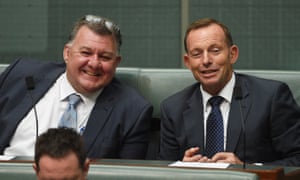Exclusive: Decisions by Labor and crossbench to save clean energy agencies encouraged investment, report says
The Senate’s decisions to stop Tony Abbott abolishing clean energy agencies helped create renewable energy projects worth $23.4bn, a new report says.
The Australia Institute says decisions taken by Labor and the crossbench between 2013 and 2015 to save the Clean Energy Finance Corporation and Australian Renewable Energy Agency (Arena) have now secured $7.8bn in public funding and investment for clean energy.
Together with the renewable energy target – which was retained but reduced to 33,000GWh by 2020 – these measures will cut greenhouse gases by 334m tonnes over their lifetime, compared with 192m tonnes through the Coalition’s emissions reduction fund.
The Australia Institute released the Saved by the Bench report alongside polling that showed Australians supported the Senate’s role as a check on government power but were split on whether it blocked government legislation too often.
Climate change
will be a central issue in this year’s federal election – Labor is
promising more ambitious emissions reduction targets and conservative
Coalition figures want to wind back support for renewables.The Australia Institute says decisions taken by Labor and the crossbench between 2013 and 2015 to save the Clean Energy Finance Corporation and Australian Renewable Energy Agency (Arena) have now secured $7.8bn in public funding and investment for clean energy.
Together with the renewable energy target – which was retained but reduced to 33,000GWh by 2020 – these measures will cut greenhouse gases by 334m tonnes over their lifetime, compared with 192m tonnes through the Coalition’s emissions reduction fund.
The Australia Institute released the Saved by the Bench report alongside polling that showed Australians supported the Senate’s role as a check on government power but were split on whether it blocked government legislation too often.
After its election in 2013, the Abbott government successfully repealed Labor’s emissions trading scheme and interim carbon price but was thwarted in its attempts to abolish key environmental agencies.
The report found that Australia’s investment in renewables dropped 46% in the three years after 2013, but “has since rebounded dramatically, to a record high of US$8.5bn in 2017”.
The report credits decisions by Labor, the Greens, Palmer United party and other crossbenchers for ensuring “investment in renewable energy has continued through a time of great uncertainty for the energy sector”.
It said that between 2013 and 2018, the CEFC gave loans worth $6.6bn to clean energy projects, encouraging a further $12.3bn of private sector investment.
During that time, Arena gave $864m in grants and has committed to a total of $1.2bn by 2022.
“In total, those projects are worth $4.4bn, meaning that each dollar of Arena support leverages about 2.7 dollars of private funding,” it said.
Small-scale renewable certificates issued under the renewable energy target have helped more than 805,000 Australian homes install solar panels and supported the connection of 225,000 solar hot water systems by households.
In the year to June 2018, renewable energy supplied a record 15.7% of power in the national energy market, and this is tipped to reach 37% by 2030, thanks to the renewable energy target and state targets in Queensland and Victoria.
The Australia Institute executive director, Ben Oquist, said that despite earlier plans to axe Arena and the CEFC, “the Coalition has reversed its position … as a result of their strong performance”.
“There are few examples that show just how crucial the role of the Senate crossbench is than renewable energy investment post 2013.”
Labor has promised an emissions reduction target of 45% in the electricity sector but the Coalition has been left without a policy since Malcolm Turnbull ditched the emissions reduction component of the national energy guarantee.
As the New South Wales Liberal party positions itself in favour of taking stronger action on climate change, Abbott and the influential backbench MP Craig Kelly have called for an end to renewables subsidies.
The Greens have asked for voters to elect Greens senators in an election expected to deliver government to Labor by promising to push Labor “to be as ambitious as it possibly can be” on emissions reductions.
The Australia Institute’s poll of 1,449 respondents found voters were split on the performance of the Senate, with 38% agreeing that it blocked government legislation too often and 34% disagreeing.
Voters registered strong support for statements that: the Senate should pass legislation on its merits (73% to 12% opposed); negotiation leads to better laws (66% to 20%); and it is bad for the country when the government also controls the Senate (63% to 24%).
They disagreed with the statements that Australia would be better off without the Senate (55% opposed, 22% in favour) and that the Senate should generally pass government legislation (66% opposed, 20% in favour).
In December, the Australian Energy Markets Commission estimated that increased wind and solar generation would help drive power prices down by 2.1% on average in the next two years, with the typical household saving $55 a year in wholesale power costs.

No comments:
Post a Comment